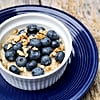

We are familiar with keto, the high-fat and low-carb diet that has become the latest weight-loss trend, but were you aware that it might have emotional benefits as well? "It might sound like snake oil, but do any digging on the internet about the ketogenic diet, and you'll find personal stories of rapid weight loss and improved memory," said Emily Bartlett, a holistic health professional and founder of Real Plans, a meal-planning service that offers recipes following a keto diet plan. You'll also find a bit of science explaining how tumor cells rely on sugar for fuel and learn how with access to only ketone bodies, they die. Or how a ketogenic diet can improve mood.
The point of this diet is to avoid carbs like the plague and consume plenty of fat so that you can make ketonic fuel. "If you've got a health problem you can't hack - and this problem involves blood sugar control, brain health, or your metabolism - you may thrive on a keto meal plan," Bartlett said. The good news is that eating low-carb foods doesn't mean you leave the table unsatisfied.
"If you regularly feel hungry, tired, shaky, or have headaches and mood swings in between meals, there's a good chance you're not eating enough fat and/or overconsuming carbohydrates and sugar," said Dr. Josh Axe, D.N.M., C.N.S., D.C., founder of DrAxe.com, bestselling author of Eat Dirt and cofounder of Ancient Nutrition.
The ketogenic diet puts the body into a state of ketosis, meaning it pushes the body to burn through glucose (sugar from carbohydrates) and forces stored fat to be used for energy. "This process creates ketone bodies, which provide the brain with a steady supply of fuel. Research shows that ketones are effective against mental-health-related pathologies associated with altered glucose metabolism," Dr. Axe said.
A study conducted by the University of Tasmania, where rats were given a keto diet, showed they had reduced levels of anxiety. Two of the main reasons the keto diet can help alleviate anxiety is due to the increase in healthy fats and the decrease in sugar. "Sugar is a culprit of many mood disorders and can be found in most everyday items, which can make it hard to stay away from. Additionally, when you are feeling stressed or anxious, your body tends to crave sugary foods because your body is looking for a quick, feel-good serotonin boost. However, sugar will only lead to a crash and can actually worsen anxiety symptoms over time," said Lindsey Smith, author of the forthcoming book Eat Your Feelings: The Food Mood Girl's Guide to Transforming Your Emotional Eating. Additionally, with the increase in healthy fats, such as avocados or fish, a keto diet can help boost brain function, promoting new cell growth, which can help combat mood issues such as depression and anxiety.
Other animal studies have found that the ketogenic diet has many neurological effects, including an antidepressant effect. "One study conducted on mice found that ketogenic diet offspring (mice exposed to the keto diet in utero) exhibited reduced susceptibility to anxiety and depression and elevated physical activity levels," Dr. Axe said.
"These neurotransmitters play a role in anxiety and depression, which is why the ketogenic diet may offer some antidepressant and antianxiety benefits. Other benefits associated with the keto diet include increased vascular density in the brain, protection against neuronal loss, and reduced risk for Type 2 diabetes, Alzheimer's disease, and brain cancer," Dr. Axe said.
On the other hand, the link between food and mood isn't always a positive one if you're not sticking to the best food selection. "It's becoming more and more mainstream knowledge that your gut has a major impact on your overall health and mood. One study in particular showed that a high-fat diet not only affected the gut microbiota, but also caused the most weight gain when compared to other diets and had a negative impact on anxiety and behavior," according to Keri Glassman, MS, RD, CDN and founder of Nutritious Life. "This isn't to say that a diet loaded with avocado, olive oil, and nut butter is bad for you - it's actually very good for you - especially when combined with lean protein and lots of veggies. But a diet packed with bacon, salted packaged nuts, and fried veggies are not - and they certainly can't be eaten in excess."
Eating plenty of healthy fats is important for preventing blood sugar swings and symptoms of hypoglycemia, which can trigger nervousness and other feelings of anxiety. "If possible, it's ideal to do intermittent fasting in tandem with the ketogenic diet for even more powerful effects. Intermittent fasting (or IF) involves limiting your 'eating window' to about 8-10 hours per day - in other words only consuming solid foods within a finite period of time to give your body a chance to digest, cleanse, and focus on repair work while you fast," Dr. Axe said.
While following the ketogenic diet, your meals will provide plenty of fat; in fact, up to 85 percent of your daily calories will be from sources of fat, such as coconut oil, butter, olive oil, fatty meat, etc. "Both your lunch and dinner would include several servings of fat, usually some nonstarchy veggies, and a moderate portion of protein, another important macronutrient for mood stabilization. Some people choose to skip breakfast altogether on the keto diet, to start the day with something like eggs and veggies, or to just drink coffee with coconut oil," Dr. Axe said. All of these are big improvements compared to other breakfast options, like a muffin or bowl of sugary cereal, which can lead to an energy crash and jitters later in the day.
The keto diet, especially when combined with fasting, can also be helpful for normalizing "hunger hormones," particularly ghrelin and leptin, and reducing cravings tied to low blood sugar. "Ghrelin, known as the main hunger hormone, is responsible for making you hungry so that you know it's time to eat, while leptin helps to control your appetite. During ketosis, and while in a fasted state, ghrelin levels in your body stabilize so you can more accurately respond to your hunger and fullness signals, giving you steadier energy and preventing cravings for sugar in an attempt to lift your mood," Dr. Axe said.






0 comments :
Post a Comment